
February 17
1854 Birth: Friedrich Alfred Krupp: German arms manufacturer:
Krupp was born in Essen, Germany. His father was Alfred Krupp. In 1887, Friedrich took over the leadership of his father's company. He married Margarethe Krupp (born Freiin von Ende). They had two daughters . . . .
On 15 November 1902 the Social Democratic magazine Vorwaerts claimed in an article that Friedrich Alfred Krupp was homosexual, that he had a number of liaisons with local boys and men, and that his fondest attachment was to Adolfo Schiano, an 18-year-old barber and amateur musician. A week later, Krupp committed suicide on 22 November 1902. In a speech at his burial, Emperor Wilhelm II attacked the Social Democratic politicians, [saying] that they had lied about Krupp's sexual orientation.
1856 Death: Heinrich Heine:
Not very religious, he converted to Christianity in 1825, to get around anti-Jewish professional restrictions. Disappointed in Germany's failure to adopt liberal policies after the fall of Napoleon (1815), he moved to France in 1831, after France's mildly reformist 1830 revolution. In 1835, all of his writings were banned in Germany. "His political writings show him a radical and a cosmopolitan . . . . He was an acute critic of philosophy. But he was most famous as a lyrical poet, pre-eminent in wit and raillery, and the Romantic movement in Germany was in part checked by his irony."
Of Heine's many songs and images, modern readers might be most familiar with the Lorelei, the golden-haired siren on the banks of the Rhine, whose dazzling looks and even more dazzling voice would lure boatmen to their doom.
Heine died 17 Feb 1856, and was buried at the Montmartre cemetery in Paris. Eighty-five years later in 1941, when France was under Nazi occupation, Hitler ordered the German army to obliterate Heine's grave. No trace of it remains.
[Note: After his conversion, he was wont to attend the Synagogue in Hamburg, deliberately to hear the Rabbi fulminate against him. Heine wrote that he was now hated by both Jews and Christians. This was a side-product of the Emancipation which, according to some, led to the 'Holocaust.' It is also ironic that his grave was obliterated by the Germans. Heine once wrote about "our beautiful Prussia," which he missed when he was in exile.‑‑Ed.]
1859 Indochina: The French Navy captures the Citadel of Saigon, a fortress . . . manned by 1,000 Nguyễn Dynasty soldiers, en route to conquering Saigon and other regions of southern Vietnam. [For further information, click here.]
1863 The International Red Cross is founded in Geneva.
1874 Birth: Thomas J. Watson, Sr.:Founder of IBM:
IBM, primarily through its German subsidiary, made Hitler's program of Jewish destruction a technologic mission the company pursued with chilling success. IBM Germany, using its own staff and equipment, designed, executed, and supplied the indispensable technologic assistance Hitler's Third Reich needed to accomplish what had never been done before-the automation of human destruction. More than 2,000 such multi-machine sets were dispatched throughout Germany, and thousands more throughout German-dominated Europe. Card sorting operations were established in every major concentration camp. People were moved from place to place, systematically worked to death, and their remains cataloged with icy automation. [For further information, click here.]
1877 Birth: Andre Maginot:
[He was a] French statesman for whom a French line of elaborate fortifications against Germany was named. The Maginot Line contributed in large part to French complacency in the face of resurgent German military might after Adolf Hitler’s rise to power in 1933.
Originally a member of the civil service, Maginot was elected to the French Chamber of Deputies in 1910 and became undersecretary of war three years later. Entering the army as a private at the outbreak of World War I, he received a wound that crippled him for life. He returned to politics in 1915 and served intermittently as minister for colonies, pensions, or war throughout the 1920s.
Maginot’s repeated demands that France construct a line of defensive fortifications along its eastern frontiers to prevent a renewed German attack began to bear fruit in 1929, during his second term as minister of war. During that term he reorganized the army and directed the beginning of construction, on the French northeast frontier, of the Maginot Line. Maginot died in early 1932, but his project continued and was completed in 1938. [Britannica.com See also Maginot Line.]
1908 Adolf Hitler:

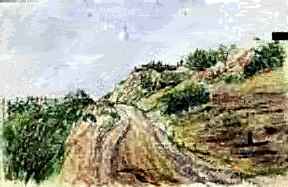
With a suitcase full of clothes and underwear in my hand, and an indomitable will in my heart, I set out for Vienna. I, too, hoped to wrest from fate what my father had accomplished fifty years before; I, too, hoped to become something, but in no case a civil servant.
1915 World War I: Various:
Zeppelin L-4 crashes into North Sea:
After encountering a severe snowstorm on the evening of February 17, 1915, the German zeppelin L-4 crash-lands in the North Sea near the Danish coastal town of Varde.
The zeppelin, a motor-driven rigid airship, was developed by German inventor Ferdinand Graf von Zeppelin in 1900. Although a French inventor had built a power-driven airship several decades before, Zeppelin's rigid dirigible, with its steel framework, was by far the largest airship ever constructed.
The L-4's captain, Count Platen-Hallermund, and a crew of 14 men had completed a routine scouting mission off the Norwegian coast in search of Allied merchant vessels and were returning to their base in Hamburg, Germany, when the snowstorm flared up, bombarding the airship with gale-force winds.
Unable to control the zeppelin in the face of such strong winds, the crew steered toward the Danish coast for an emergency landing, but was unable to reach the shore before crashing into the North Sea. The Danish coast guard rescued 11 members of the crew who had abandoned ship and jumped into the sea prior to the crash; they were brought to Odense as prisoners to be interrogated. Four members of the crew were believed drowned and their bodies were never recovered.
One month earlier, the L-4 had taken part in the first-ever air raid on Britain in January 1915, when it and two other zeppelins dropped bombs on the towns of Great Yarmouth and King's Lynn on the eastern coast of England. Four civilians were killed in the raid, two in each town. Zeppelins would continue to wreak destruction on Germany's enemies throughout the next several years of war--by May 1916, 550 British civilians had been killed by aerial bombs. (History.com)
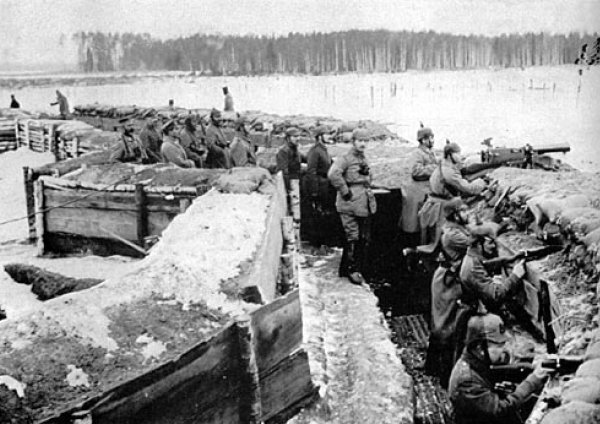
Fear of death threw us newcomers to earth, much to the amusement of the old hands . . . . Unknown territory [no-man's land] lies before me. I prick up my ears; bursts of intermittent fire from English machine guns terrify me. In my deluded state, I imagine I can see Death, and the Devil, until the person beside me brings me to me senses with scolding and curses. Patrols and sentries change over. In the evening the enemy artillery fire lights the sky. [For further details, Click here.]
1930 Weimar: Horst Wessel became the most prominent martyr of the Nazi Party. He wrote the words to the song which became the Nazi Party anthem, the Horst Wessel Song: [The Flag on High]. In this essay, Goebbels reports on his death, and begins the process of turning him into a kind of Nazi saint:
It was late in the evening and I was enjoying the rare pleasure of reading a good book. I was relaxed and at ease. The telephone rang. I picked up the phone with trepidation. It is worse than I expected. "Horst Wessel has been shot." Trembling with fear, I asked: "Dead?" "No, but there is no hope." I felt as if the walls were collapsing around me. It was unbelievable. It cannot be . . . .
[Note: Wessel was credited with the music, as well as the composition. This was clearly untrue, as the tune existed before his time. Ed.]
1933 Japan censured by the League of Nations, in a worldwide broadcast:
The legacy of the League of Nations to its successor the United Nations was a varied one. Clearly it had been too weak to solve the problems posed by the aggressive dictators. On the other hand, it had made encouraging progress on a number of humanitarian fronts. These lessons were learned. One of the UN's first actions was to set up a peacekeeping force which could enforce its decisions.
From Le Temps: "Hitler expressed surprise that he was accused of destroying liberty. He had only imitated them (his enemies) and made a law for the defense of the National State based on the model of the law for the defense of the Republic." [See: How Did Adolf Hitler Consolidate his Power?]
1934 Austrian Civil War: More than 5,000 Austrian Jews lose their jobs: [See: Austria: The Other Germany.]
In foreign affairs, he [Dolfuss] steered a course that converted Austria virtually into an Italian satellite state. Hoping therewith to prevent Austria's incorporation into Nazi Germany, he fought his domestic political opponents along fascist-authoritarian lines. In February 1934 paramilitary formations loyal to the chancellor crushed Austria's Social Democrats in bloody encounters in and around Vienna known as the Austrian Civil War.
1935 Poland: A workers' congress organized by the Socialist Party and the Communist Party, attended by numerous Jews, meets in Warsaw. (THP) 1936 Paraguay: The army rebels against President Eusebio Ayala, resulting in the creation of South America's first fascist regime. (THP) 1940 World War II: Hitler approves Manstein plan: In 1939, a group of senior German Army officers, including Erich von Manstein and Franz Halder, devised a plan to inflict a major defeat on the French Army in northern France. The Manstein Plan, as it became known, included a attack through southern Belgium that avoided the Maginot Line. The ultimate objective was to reach the Channel coast and to force the French government to surrender.
Adolf Hitler gave his approval to the Manstein Plan on 17th February, 1940, but it was not activated until the 10th May, when the Luftwaffe bombed Dutch and Belgian airfields and the German Army captured Moerdijk and Rotterdam. Fedor von Bock and the 9th Panzer Division, using its Blitzkreig strategy, advanced quickly into the Netherlands. Belgium was also invaded and the French 7th Army moved forward to help support the Dutch and Belgian forces.
The 7th Panzer Division under Erwin Rommel and the 19th Corps commanded by Heinz Guderian and the 6th and 8th Panzers led by Gerd von Rundstedt, went through the heavily wooded and semi-mountainous area of the Ardennes, an area, north of the Maginot Line. The French military had wrongly believed that the Ardennes was impassable to tanks. Seven panzer divisions reached the Meuse River at Dinant on 12th May and the following day the French government was forced to abandon Paris. [For further information, click here]
1941 Various: 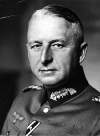
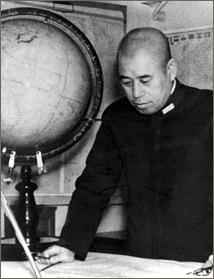
I agree with your opinions concerning how to get into a war. But it is a problem, to what extent those persons who were so beside themselves with joy, making out such a thing as the Tripartite Pact, would stick to their own opinions in the hour of need. To me there is a smell of changing the present post; however, it causes me some confusion in calculating which is better for me, either to attempt to improve the naval organization in Tokyo or to continue to make the fleet as in the pink as ever. [See: Countdown to Infamy: Timeline to Pearl Harbor.]
1942 World War II: Various: Holocaust: Germany:
From an order issued by Alfred Rosenberg:
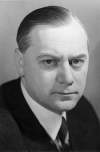
1. The death penalty, or, in lesser cases, penal servitude will be inflicted upon: Those who undertake to use violence against the German Reich or against the high authority established in the occupied territories; those who undertake to commit violence against a Reich citizen or a person of German nationality for his or her belonging to this German nationality; those who undertake to use violence against a member of the Wehrmacht or its followers, the German police including its auxiliary forces, the Reich Labor Service, a German authority or institution, or the organizations of the NSDAP; those who appeal or incite to disobedience of orders or directives issued by the German authorities; those who with premeditation damage the furniture of German authorities and institutions or things used by the latter for their work or in the public interest; those who undertake to assist anti-German movements or to maintain the organizational connection of groups prohibited by the German authorities; those who participate in or incite hostile activity and thus reveal anti-German mentality or who by their behavior lower or injure the authority or the welfare of the German State and people; those who premeditatively commit arson and thereby damage German interests in general or the property of a Reich citizen or persons of German nationality.
2. Furthermore, the death penalty and, in lesser cases, penal servitude is to be inflicted upon: Those who agree to commit any punishable action as foreseen by Paragraph 1; those who enter into serious negotiations on that subject; those who offer their services to commit such an action or accept such an offer; or those who possess credible information on such an action or its intention at a moment when the danger can still be averted, and willfully refrain from warning the German authorities or the menaced person in due time.
3. An offense not coming under Paragraphs 1 and 2 is to be punished by death, even if this penalty is not provided for by the general German criminal laws and by decrees of German authorities, if the offense is of a particularly base type or for other reasons is particularly serious. In such cases the death xenalty is also permissible for juvenile hard criminals. 4. (1) If there is insufficient justification for turning the case over to competent courts-martial, the special courts are competent. (2) The special instructions issued for the Armed Forces are not hereby affected."
1943 World War II: Hitler flies to Manstein's headquarters—at Zaporozhye on the Eastern Front. He will stay there until February 19 when he agrees to Manstein's plan for a counterattack. [See: Was Adolf Hitler a 'Great' Military Leader?]
1944 World War II: War in the Pacific: Various: The Battle of Truk:
The Battle of Truk was one of the most significant air battles of World War II. The Japanese losses were a record for any one action in the war. The submarine USS Tang (SS-306) rescued 22 Navy pilots who had been shot down, a rescue record unsurpassed until near the end of the war. The action was also the first combat role for the battleship New Jersey (BB-62), serving as Spruance's flagship.
U.S. troops land on Eniwetok atoll:
Operation Catchpole is launched as American troops devastate the Japanese defenders of Eniwetok and take control of the atoll in the northwestern part of the Marshall Islands.
The U.S. Central Pacific Campaign was formulated during the August 1943 Quebec Conference. President Franklin D. Roosevelt and Prime Minister Winston Churchill agreed on, among other things, a new blueprint for fighting in the Pacific: an island-hopping strategy; the establishment of bases from which to launch B-29s for a final assault on Japan; and a new Southeast Asia command for British Adm. Louis Mountbatten.
The success of the island-hopping strategy brought Guadalcanal and New Guinea under Allied control. Though those areas were important, the Allies also still needed to capture the Mariana Islands, the Marshall Islands, and the Gilbert Islands, which had comprised an inner defensive perimeter for the Japanese. Each was a group of atolls, with between 20 to 50 islets, islands, and coral reefs surrounding a lagoon. The Allies planned an amphibious landing on the islands--all the more difficult because of this unusual terrain.
On February 17, a combined U.S. Marine and Army force under Adm. Richmond Kelly Turner made its move against Eniwetok. Air strikes, artillery and naval gunfire, and battleship fire 1,500 yards from the beach gave cover to the troops moving ashore and did serious damage to the Japanese defenses. Six days after the American landing, the atoll was secured. The loss for the Japanese was significant: only 64 of the 2,677 defenders who met the Marine and Army force survived the fighting. The Americans lost only 195.
The position on Eniwetok gave U.S. forces a base of operations to finally capture the entirety of the Marianas. Eniwetok was also useful to the United States after the war--in 1952 it became the testing ground for the first hydrogen bomb. (History.com)
1945 Various:
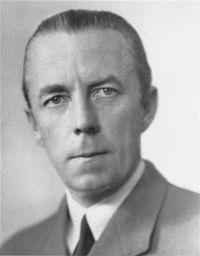

The advent of the long-range, radio-controlled, jet-propelled projectile has opened up vast new possibilities in the conduct of military operations. In future the possession of superiority in long-distance rocket artillery may well count for as much as superiority in naval or air power. High-grade scientific and engineering staff, together with extensive research facilities, will have to be maintained as a permanent part of our peacetime military organization.
1947 Cold War: Voice of America begins broadcasts to the Soviet Union:
With the words, "Hello! This is New York calling," the U.S. Voice of America (VOA) begins its first radio broadcasts to the Soviet Union. The VOA effort was an important part of America's propaganda campaign against the Soviet Union during the Cold War.
The VOA began in 1942 as a radio program designed to explain America's policies during World War II and to bolster the morale of its allies throughout Europe, Asia, the Middle East, and Africa. After the war, VOA continued as part of America's Cold War propaganda arsenal and was primarily directed toward the western European audience. In February 1947, VOA began its first Russian-language broadcasts into the Soviet Union. The initial broadcast explained that VOA was going to "give listeners in the USSR a picture of life in America." News stories, human-interest features, and music comprised the bulk of the programming. The purpose was to give the Russian audience the "pure and unadulterated truth" about life outside the USSR. Voice of America hoped that this would "broaden the bases of understanding and friendship between the Russian and American people. (History.com)
1957 USSR: Gromyko becomes foreign minister:
Andre Gromyko was installed as Soviet Foreign Minister on February 17, 1957. Gromyko was called to foreign service in 1939 and began by serving under a policy of cooperation with the Nazis before Hitler's attack on Russia. After World War II he became an expert at Cold War diplomacy. Seen first as a hard liner, he shifted his positions as the times demanded. He served through three decades, surviving most of the Soviet leaders he worked for and most of the world leaders with whom he quarreled and negotiated. (History.com)
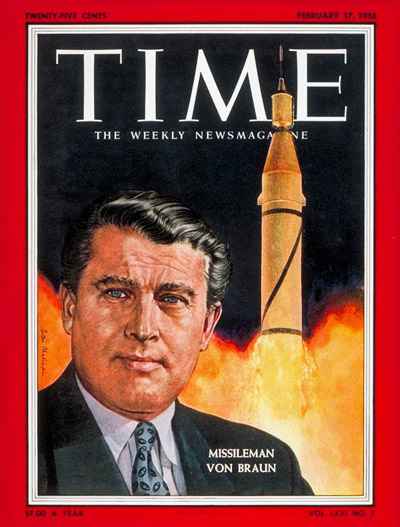
1958 Wunderwaffen: A feature article profiling Werner von Braun (Note: Werner von Braun, Hitler's former chief rocket scientist, is now working for the US.), Reach for the Stars, is published in TIME Magazine:
Army brass marched with a color guard into a Capitol Hill hearing room to present a new service flag to the House Military Appropriations Subcommittee. Patrols of Army public-relations officers prowled Pentagon corridors, passing out word that, given the chance, the Army could develop a rocket motor to put a 15-ton satellite into space with a man aboard. The Air Force stood that sort of talk as long as it could, then leaked a story about using its Thor intermediate-range ballistic missile to put up a 1,000-lb. satellite as early as June. The Army promptly upped the ante to 1,500 lbs.—and the Pentagon's inter-service storm signals were flapping furiously.
A Broomstick Would Do. Yet, for all the rivalry, hard-working servicemen and civilian specialists, along the whole broad front of U.S. missilery, felt a new nearness to space as Explorer radioed back its readings. And of the legions of scientists, generals, admirals, engineers and administrators, at work on missiles and man-made moons, German-born Wernher von Braun, 45, best personified man's accelerating drive to rise above the planet. Von Braun, in fact, has only one interest: the conquest of space, which he calls man's greatest venture. To pursue his lifelong dream, he has helped Adolf Hitler wage a vengeful new kind of war; has argued against bureaucracy in two languages; and [has] campaigned against official apathy and public disbelief, on two continents, through most of his adult years.
A robust (5 ft. 11 in., 185 Ibs.), hearty man with a booming laugh, and a frank manner, he can be both ruthless and devious in his striving for space. To some, Von Braun's transfer of loyalty from Nazi Germany to the U.S., seemed to come too fast, too easy. Von Braun's critics say he is more salesman than scientist. [For the full text of the article, Click here.]
1963 Berlin: Soviet leader Nikita Khrushchev visits the Wall:
While America's seemingly contradictory approach‑‑stockpiling weapons while Eisenhower was warning about the military-industrial complex‑‑was taking place in the late 1950s, the Soviets had serious [problems] of their own to deal with, primarily in Germany and China.
Beginning in 1958 and lasting into the early years of the Kennedy presidency, the USSR again brought the issue of East Germany [the GDR] to the forefront of world politics, eventually leading to the creation of a wall to separate East from West Berlin. By 1958, the west had still refused to recognize the GDR as an independent country, so the Soviets continued to underwrite the East German government while trying to contain West Germany [the FRG].
Khrushchev, however, was reluctant to continue that relationship, both because it was costly to support the GDR, whose economy was in distress, and because he feared that the FRG would acquire its own nuclear weapons arsenal, separate from NATO. Moreover, Konrad Adenauer, the West German president, was publicly appealing for a reunification of the two Germanys, which would be a huge blow to the Soviets, both in terms of prestige and security.
By late 1958, the USSR feared that the FRG might take some drastic actions against the East, either politically, economically, or militarily. Thus Khrushchev felt he had to take action, and in a series of speeches in November 1958 he presented the west with a hard dilemma, calling on the western states with occupation rights the United States, Britain, and France to sign the German peace treaty, or else the USSR would reach a separate treaty with the GDR granting it independence, and giving it full control over all of Berlin, and he set a six month timetable for such actions. Khrushchev was serious about the German issue, also cautious..
1972 Various:
Volkswagen: Beetle overtakes Model T as world's best-selling car:
The 15,007,034th Volkswagen Beetle comes off the assembly line, breaking a world car production record held for more than four decades by the Ford Motor Company's iconic Model T, which was in production from 1908 and 1927.
The history of the VW Beetle dates back to 1930s Germany. In 1933, Adolf Hitler became Chancellor of Germany and announced he wanted to build new roads and affordable cars for the German people. At that time, Austrian-born engineer Ferdinand Porsche (1875-1951) was already working on creating a small car for the masses. Hitler and Porsche later met and the engineer was charged with designing the inexpensive, mass-produced Volkswagen, or "people's car." Hitler's plan was that people could buy the cars by making regular payments into a savings stamp program. In 1938, work began on the Volkswagen factory, located in present-day Wolfsburg, Germany; however, full-scale vehicle production didn't begin until after World War II.
In the 1950s, the Volkswagen arrived in the U.S., where the initial reception was tepid, due in part to the car's historic Nazi connection as well as its small size and unusual rounded shape (which later led to it being dubbed the "Beetle"). In 1959, the advertising agency Doyle Dane Bernbach launched a groundbreaking campaign that promoted the car's diminutive size as a distinct advantage to consumers, and over the next several years, VW became the top-selling auto import in the US. [For further information, click here]
Cold War: President Nixon departs on his historic trip to China:
He is to reach Peking on Monday morning, China time (Sunday night, New York time), for a week's stay on the mainland that is to include two conferences, with Chairman Mao Tse-tung and meetings with Premier Chou En-lai.
Addressing 'Vice' President Agnew, the leaders of Congress, members of his Cabinet and a large crowd assembled on the White House lawn this morning to bid him farewell, the President said in a brief statement that the United States and China must "find a way to see that we can have differences without being enemies in war." [For further information, click here.]
1979 China invades Vietnam:
In response to the Vietnamese invasion of Cambodia, China launches an invasion of Vietnam.
Tensions between Vietnam and China increased dramatically after the end of the Vietnam War in 1975. Attempting to expand its influence, Vietnam established a military presence in Laos; strengthened its ties with China's rival, the Soviet Union; and toppled the Cambodian regime of Pol Pot in 1979. Just over a month later, Chinese forces invaded, but were repulsed in nine days of bloody and bitter fighting. Tensions between China and Vietnam remained high throughout the next decade, and much of Vietnam's scarce resources were allocated to protecting its border with China and its interests in Cambodia. [For further information, click here]
2008 Balkans: Kosovo declares itself a nation in defiance of Serbia and Russia. (AP)
Edited by Levi Bookin (Copy editor) Click to join 3rdReichStudies FAIR USE NOTICE: This site may contain copyrighted material the use of which has not always been specifically authorized by the copyright owner. We are making such material available in our efforts to advance understanding of historical, political, human rights, economic, democracy, scientific, environmental, and social justice issues, etc. We believe this constitutes a 'fair use' of any such copyrighted material as provided for in section 107 of the US Copyright Law. In accordance with Title 17 U.S.C. Section 107, the material on this site is distributed without profit to those who have expressed a prior interest in receiving the included information for research and educational purposes. If you wish to use copyrighted material from this site for purposes of your own that go beyond 'fair use', you must obtain permission from the copyright owner. Please note that the list-owner and the moderator are not responsible for, and do not necessarily approve of, the random ads placed on our pages by our web server. They are, unfortunately, the price one pays for a 'free' website.
levi.bookin@gmail.com






